|
|
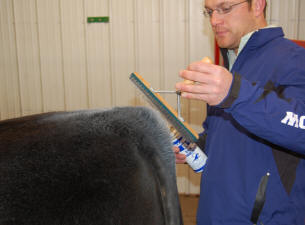 |
Josh Elder
Tail Head
When Fitting the tail
head it is important to
use the proper tools and
products. I prefer to
start with
Sullivanís tail adhesive
as a product and
the Hair wizard as a
tool. Lightly spray the
tail adhesive and comb
through after every two
sprays until all the
hair is standing up, or
until u have the desired
look. Next you want to
coat the tail head with
Sullivanís white touch
up, which will help
build the hair, as well
as giving you more of a
visual aid when it is
time to clip. When
clipping out the tail
head you want to level
out any guard hairs and
round out the tip of the
tail Head. This will
give the appearance that
you calf is correct out
of their hip.
|
|
|
|
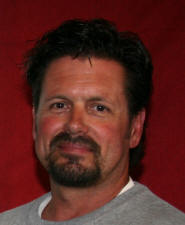 |
Jeff Sargeant
Sullivan's Revive
One of the key ways
we use Sullivans
Revive is on show
day. After breaking
down with Hocus Pocus
then washing and
blow drying our cattle
out, we put a good coat
of the new and improved
Revive with
Vita Hair all over.
Especially on the glued
areas to allow the skin
and hair conditioner to
do its job. This will
really help on back to
back show days
|
|
|
|
 |
Brad Cox
Tip for the
Southern States!
One thing that people
need to do to cattle in
the spring is get rid of
dead hair. That way the
new fresh hair will come
in. Depending on breed &
when you plan on showing
next matters when
deciding whether to
slick shear your cattle.
Getting rid of the dead
hair will make your
animal feel better and
look fresher. Living in
the southern us we need
any edge we can get for
hair. There is several
ways we can do this. I
like to use a Sullivan
New shedding comb. If
I'm planning on going to
summer shows you can use
the shedding comb & go
down. And clip your
animal like you would
for a show and leave
belly & legs while
blending the top & belly
using my Sullivan
x-blocks. This takes
some time to do this in
order to get the hair
smooth. You should allow
around 6 weeks for the
lines to grow out as
this method will look a
little rough where the
plucking blades were
used.
Another
way to get rid of dead
hair is to use the show
me brush which is a
favorite of mine. When
you do this it's good to
clip your animal like
you would for a show and
do this as long as it
takes or until you get
the dead hair out. A
good trick that also
works well is to spray
some prime time or even
tail adhesive over the
body & use your regular
Sullivan blade scotch
comb to pull out the
dead hair. After youíre
done combing the hair
out use Hocus Pocus or
unfit to break adhesive
down & wash out with
Sullivan clear choice
shampoo.
Just
remember every situation
is different depending
how much hair your
animal has & where you
plan showing.
|
|
|
|
|
|
Halter Breaking 101
Tony Austin, Austin
Cattle Co. Ė Weatherford TX
Halter breaking your
next years show project
can be made easier and
more effective by
following the correct
steps in earning the
trust of your new calf.
This is a 5 day step by
step process that has
been very successful for
us.
Transportation and
delivery
Some of
the best gentle natured
calves can become
traumatized by being
hauled in a stock
trailer for the first
time by themselves. This
bad experience can set
you back several days in
the gentling/breaking
process. Always try to
take a seasoned or
experienced show animal
to ride back on the
trailer when you go to
pick up your new
project. This will help
reduce the stress level
on the ďnew guyĒ which
may have never been
hauled previously. Itís
also a good idea to give
the calf a pen mate
until he is adjusted to
his or her new
surroundings.
Dayís one thru three
Go in the pen and
let the calf become used
to being confined with
your presence. His first
instinct may be to run
around the perimeter
sniffing and snorting,
looking for an escape
route. Just be slow and
calm and talk to the
calf. Once he has
settled and realizes he
isnít in danger bring a
blower to the outside of
the pen and run the hose
beneath the fence. This
will safeguard the calf
from damaging the blower
or injuring himself. Use
the blower to blow on
the calfís legs, belly
and entire body. This
will get him familiar
with the feel of being
touched and get him used
to the blower dryer. Do
this for the first three
days before introducing
the halter.
Haltering the calf
Once you have
established the trust of
your new calf its time
to put the halter on for
the first time. I
recommend using a rope
halter with a slip ring
and I have my halters
custom made with an
additional two feet of
lead. This will allow us
to wrap around the panel
or fence and slide back
on the end of the lead
and get behind the calf
pushing him forward
toward the tie rail.
Until the calf is
familiar with being
caught you can use a
show stick to fish the
halter around the nose
and then the ears.
Breaking to tie
The first time we tie or
project we need to tie
at a neck or nose level
height. Do not tie him
in an elevated position
yet. I also like to
leave 18í to 24í of
slack from the tie rail
so the calf can stop
pulling back and get
relief on his jaw and
chin. The slip ring will
give slack under the
chin and provide more
comfort when he stops
pulling back. Do not
leave you calf
unattended on the first
day of tying. As the
calf earns respect of
the halter gradually tie
his head higher toward a
show position. Use a
show stick to rub and
scratch all over the
calf as a continued
trust relationship will
develop.
Some of these simple
steps can be helpful in
making the halter
breaking experience less
stressful for you and
your new calf as well as
preventing injury to
either of you.
|
|
|
|
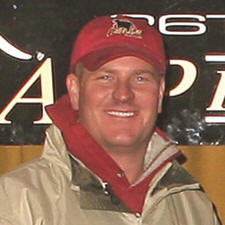 |
"When fitting a leg
there is one product
line that stands out.
Sullivanís
Primetime and Tail
Adhesive. They
dry completely and leave
the hair crisp so it
clips off with ease.
Sullivan adhesives
perform in all types of
weather - winter, spring
summer or fall. These
products will not wilt
or fall down in the
humidity. We proceed
with the Sullivanís
Ultra White Touchup as a
leg builder and use
Black Finisher as our
final cover-up. Their
level of performance and
real hair-like
appearance is unmatched.
And Sullivan touch-ups
will not melt your
adhesive."
Todd Caldwell
Caldwell Show Cattle
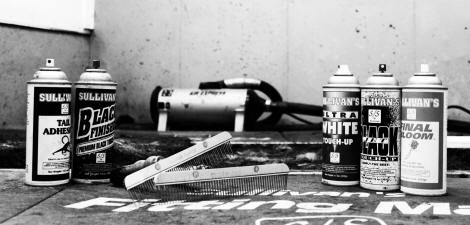
|
|
|
|
|
|
 |
|
|
|
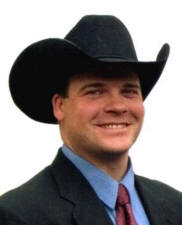 |
If you want the desired
look of a well clipped
an fitted show animal,
remember that it takes
commitment and
persistence of your
daily hair care efforts
over time. Success
doesn't just happen.
It is all of the
brushing, rinsing,
blowing, clipping and
showmanship practice for
several months prior to
show day that adds up to
big dividends. Those
that put in the time and
effort, almost always
end up near the top of
the class and in the
winner circle.
Rod Geppert
Geppert
Show Cattle
|
|
|
|
 |
"One
key that is often
overlooked in helping to
make show day run
smoothly is keeping
aerosols at room
temperature. This simple
tip allows for better
product performance and
decreases clogging in
the aerosol cans. During
summer shows put
adhesives in a bucket of
cool ice water, and in
the winter put them in
warm water. Do not let
the warm water get over
100 degrees Fahrenheit."
Dave Guyer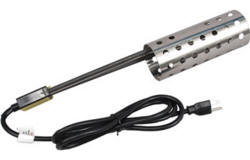
|
|
|
|
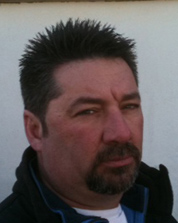
Bruce Stertzbach

Amie
Stertzbach |
"In the winter when
every day rinsing is not
possible, we believe
that
Sullivanís Russí Rag Oil
is one of your best, yet
underrated products. We
mix 1/4
Rag Oil
& 3/4
Double Dip
for what we call a deep
conditioning three-day
process. We apply this
mix with a fogger and
then comb in over the
entire body. To be left
in two to three days to
absorb into the skin. In
the summer we spray it
on at night and rinse
the next morning.
This is one of our
all-time favorite
products."
Bruce and Amy Sterzbach
|
|
|
|

Tracey Goretska
|
"During the cold winter
months, cattle hair
tends to get dry.
Replenish the natural
oils by using a mixture
of
Sullivanís Kleen Sheen
and
Sullivanís Rag Oil
(5 ounces / quart) for
daily hair care. You can
also use
Sullivanís Revive
a couple times a week to
help keep the hair
healthy."

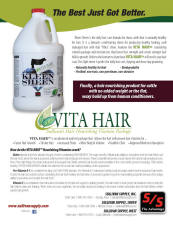
|
|
|
|

Barry Nowatzke |
With the arrival of your
calves this fall, here
are a few things to
remember to help you get
off to a good start.
Make sure you have the
proper feed ration to
start feeding your calf.
Check with the breeder
to assure the calf has
been properly
vaccinated. Take
you time when breaking
your calf, don't get in
a hurry. Make sure
you have the supplies to
get started working and
training the hair.
After washing your calf
the first time, use a
heavy coat of
Sullivan's Kleen Sheen.
Comb and blow the
Sullivan's Kleen
Sheen into the
hair, then apply a heavy
coat of
Sulllivan's Final Bloom
to the entire body,
including the legs.
Continue to blow while
applying more Final
Bloom to any dry or
dandruff areas.
This will help to get
the hide in better
condition, promote hair
growth, and train the
hair.
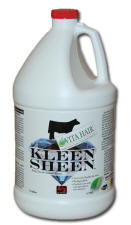
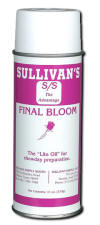
|
|
|
|

James Sullivan |
How do you keep
your cattle hydrated at
a show?
Keeping you animal
hydrated at a show is
just like everything
else, it starts at home.
Before going to any show
you should always paste
your animal with some
electrolytes. (A great
example of an
electrolyte paste is
Sullivanís
Electro-Charge Paste).
Also, before the show
put some Refresh into
their feed, this product
will help to prevent
dehydration. These two
products allow for a
healthy buildup of
electrolytes before your
animal gets into any
stressful situation.
While at the show, mix
in the Refresh into the
water every time you
water your animal.
Throughout the day keep
letting them have as
much water as they want.
These couple easy steps
will allow your animal
to travel well and look
their freshest.
|
|
|
|